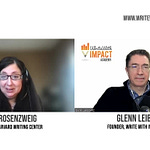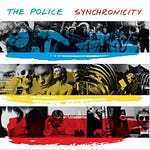One of the most important skills college students can develop that will help them in their careers, regardless of what field they pursue, is the ability to express their thoughts clearly and persuasively through writing.
It took me a while to arrive at this realization after I graduated, and even more time to sharpen my own writing skills. But when I finally put my mind to it, and became more intentional about improving my writing skills, I made substantial improvements that have had a powerful and lasting impact on my career.
But don’t just take it from me. Here’s Andrea Koppel, founder of College2Career Academy and host of the Time4Coffee podcast, on the importance of learning to write well:
“Even in a world where text messaging is ubiquitous, being able to write complete sentences, being able to express your thoughts, whether you’re an engineer, an educator, or an executive in the C-suite is foundational. You have to know how to craft a basic email. You have to know how to write a letter. You need to be able to put words on a piece of paper and convey your thoughts in a clear and simple way.”
Andrea should know about the importance of crafting clear and cogent sentences. For more than a decade, she was an international correspondent for CNN, churning out 1–2 scripts on a daily basis. Post-CNN, after working in a number of communications roles in the non-profit sector, Andrea made another career pivot and dedicated herself full-time to helping “confused college students, new grads, and young professionals build meaningful careers they’ll love.”
Through her top-rated podcast, Time4Coffee, Andrea has spoken to hundreds of accomplished executives from a broad range of industries and job functions about their career paths and their advice for young grads trying to break into the jobs they’ve mastered.
Andrea talks a lot: on her podcast, and on her daily video updates that she posts on LinkedIn. But she also writes a lot, dishing out practical tips and sharing inspiring nudges to her growing network of followers and clients who increasingly turn to her for advice. Her insightful updates even led earlier this year to being named by LinkedIn’s editors as one of the top job search experts to follow.
Working with so many young people through her coaching business, Andrea has detected a pattern to their writing:
“What I have found with many of the young people who either come to work with me as interns, or those I coach, is so often they have a lot of parenthetical phrases, their sentences run on and on, it’s hard to follow them. I think you just need to crystallize your thoughts. That doesn’t mean that you can’t be creative in grabbing someone’s attention in, say, a LinkedIn post.”
Learning to write well was one of the many topics I covered with Andrea in a recent conversation for my podcast, Write With Impact, and for Write With Impact Academy, my new learning community where I help students and professionals from around the world learn to become better writers.
Here are some practical take-aways from our conversation (watch the complete Writing Masterclass with Andrea at the bottom of this post):
Expand your mind: Take liberal arts courses
“Whether it’s French literature, Shakespeare, or whether it’s philosophy or psychology, or any of the liberal arts such as history. So many people like our parents or their generation would look at that and say, what are you going to do? And even today, they ask, what are you going to do with that liberal arts degree? It’s far more practical to study business, to study economics, to study engineering, medicine, become a lawyer, whatever.
But I am telling you, some of the most important skills that you will need in any industry are drawn from critical thinking, your ability to write clearly, and to communicate in an effective way. Get exposure to other subjects that broaden your mind and help you think expansively.”
Read the great writers
“Read the great writers, and that’s probably more on the fiction side than nonfiction. Think more Ernest Hemingway than James Joyce, because Hemingway wrote simple, clear, declarative sentences.”
Craft a lead sentence that makes people want to read
“In my experience, having worked as a broadcast journalist for CNN, where I would write at least one script a day, sometimes two, and I would maybe be doing sometimes 10, sometimes 20 live shots in a day, I had to learn to write very quickly.
And that’s why I talk about that lead sentence. Sometimes I would get stuck on that and I always start with my lead sentence and then the rest flows from there. There’s more and more competition for eyeballs, so you want to think about a lead sentence or two that is going to make people want to keep reading.”
Learn by doing: Start writing!
“You learn by doing. Whether it’s writing in a journal where no one else is going to see it, writing a blog that you start, it’s super easy to do. Whether it’s writing for your school newspaper, or whether it’s pitching articles to another blog or another media outlet, you need to do it, even if you don’t want to be a journalist. I’m saying this to those of you who aren’t necessarily interested in journalism. This is a foundational skill: To learn how to express yourself clearly and succinctly in writing.”
Writing is like lifting weights
“By doing it over and over and over again, it’s like lifting weights. When you write on a daily basis, or multiple times in a week, you may start off with the wimpy three pound weight, but as time goes on, suddenly this is going to be super light, and you’re going to be able to increase the weight. And instead of writing once on LinkedIn, you’ll be able to write twice a day, or three times a day. I’m somebody who has learned to write very, very quickly because I have to do it every day.”
Enjoy the process (and the impact)
“I love it. I really enjoy the act of trying to craft something that is going to be meaningful to my audience, that will help them in some way, provide them with some value, whether it’s just pumping them up to keep muscling through the week, or whether it’s providing actionable tips that they can use to write posts on LinkedIn, or network, or do informational interviews, or optimize their LinkedIn profile. I enjoy the process of writing.”
Watch the complete Writing Masterclass with Andrea Koppel here:
What do you think about Andrea’s advice? Would you add anything, disagree? Share your thoughts in the comments! Let’s have a conversation.
















Share this post